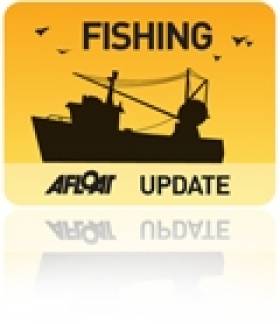Displaying items by tag: treatment
#FishFarm - Bord Iascaigh Mhara (BIM) has responded to concerns from environmental groups that an ingredient in treatments for sea lice in salmon farms poses a threat to wild marine life.
As Galway Bay FM reports, campaigners Galway Bay Against Salmon Cages - one of the groups opposed to the planned Galway Bay fish farm - say that cypermethrin, an active ingredient in veterinary medicine used to treat sea lice, is toxic to aquatic organisms.
BIM aquaculture manager Donal Maguire attempted to play down fears over the use of the pesticide, saying it has been fully tested for toxicology in the marine environment.
However, another campaign group claims BIM's position is contrary to the manufacturer's own warnings on the use of the drug.
According to FishNews.eu, Friends of the Irish Environment (FIE) cited the Irish Medicines Board's product description for cypermethrin, which states that it is "dangerous to fish and other aquatic life" and demands that the chemical "should not be allowed to contaminate water".
FIE went on to describe cypermethrin as "a biocide which kills life, not a medicine that saves lives" and as "a highly active neurotoxin" with "known effects on fish and, most sensitive of all, crustaceans such as crabs and lobsters. Bathers and watersports [enthusiasts] may also be at risk."
Earlier this month, Inland Fisheries Ireland (IFI) expressed "serious concerns" over the findings of a study on wild salmon in Ireland that claimed fish farm schemes were less harmful to wild fish than pollution and possibly even beneficial to wild catchments.
IFI is among the significant opposition to BIM's proposed organic salmon farm off the Aran Islands, a 500-hectare project that would be the largest of its kind in Europe and create hundreds of jobs in the locality.
Health Minister Speaks Out Against Fingal Sewerage 'Super Plant'
#NEWS UPDATE - The Minister for Health has raised concerns over a new water treatment 'super plant' planned for Fingal, amid fears that a malfunction could see huge amounts of raw sewerage pumped into the Irish Sea.
As reported in The Irish Times, Dr James Reilly echoed worries expressed by his north Dublin constituents and members of community group Reclaim Fingal Alliance, noting that the people of Skerries, Loughshinny and Rush are particularly "worried about the effects of the outfall pipe in their area".
The minister said that none of the nine sites being considered by Fingal County Council and Greater Dublin Drainage was suitable for sewerage treatment, and that any waste should be treated to "advanced levels" to make the outfall as clean as possible, thereby avoiding adverse impact on shellfish beds.
As many as 10,000 letters of objection have been lodged against the plan by campaigners including local farmers and environmentalists.
The Irish Times has more on the story HERE.
Wildlife Groups Pledge Union With Oil Spill Response Plan
#MARINE WILDLIFE - The Evening Herald has highlighted the work of a new union of wildlife protection groups which is training volunteers to act the event of serious environmental threats to Ireland's sea bird population.
Wildlife rescue volunteer Pauline Beades from Garristown in north Co Dublin has been working with Ireland's animal groups to change the official approach to wildlife - particularly birds - that get caught in oil spills.
The Irish Seal Sanctuary, Birdwatch Ireland, the ISPCA, the Irish Whale and Dolphin Group (IWDG), Coastwatch and Irish Wildlife Trust have written a joint "letter of comfort" for the Irish Coast Guard, which is the State body charged with dealing with coastal oil spills.
The groups have pledged to work together in the event of any oil spill that involves a threat to marine wildlife.
Their response plan involves an initial wave of volunteers walking beaches to gather affected animals and providing first aid, followed by transfering them to veterinarians in specialised field hospitals, as well as facilities for longer-term care.
Recently Beades helped train volunteers in Limerick, who also attended lectures and demonstrations from visiting wildlife rescue experts from Europe to prepare for any potential sea-borne wildlife emergency.






























































